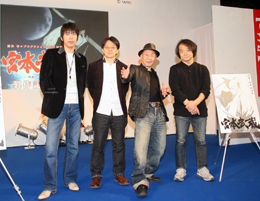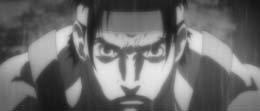Musashi press conference report
Musashi: The Dream of the Last Samurai is Production I.G's upcoming feature film, written by Mamoru Oshii and directed by Mizuho Nishikubo.
The movie focuses on Miyamoto Musashi (circa 1584-1645), a Japanese swordsman who became renowned through stories of his distinctive style and excellent swordsmanship in numerous duels. He is particular famous outside Japan as the author of The Book of Five Rings, a manual on strategy, tactics, and philosophy that is still studied today: some business leaders find its discussion of conflict and taking the advantage to be relevant to their work. However, many details of Musashi's life are still debated. The existing corpus of chronicles, hagiographic material and pure legends is countless as the fictional works that depict his figure (including an Academy Award-winning movie starring Toshiro Mifune), and this immense variety of sources has generated a popular figure that is widely known but rather distant from truth.
Maverick filmmaker Mamoru Oshii (Ghost in the Shell, The Sky Crawlers) is the mastermind behind the original concept for this movie, has taken on an unusual portrayal of this controversial character, unrivalled swordsman and spiritual seeker between reality and fiction...
The following is the report of the press conference that took place in March 2009. On stage, Mitsuhisa Ishikawa, President & CEO of Production I.G; director Mizuho Nishikubo; Mamoru Oshii and the rock musician Shigeru Izumiya
Ishikawa-san, can you tell us more about how this project was started?
Ishikawa: I think it was about two years ago. Oshii-san and I were at George Lucas' Skywalker Ranch for The Sky Crawlers sound recording sessions. I recall that Oshii-san kept me awake all night talking about his dream to make a big budget movie with huge box office returns. At that time, he did not mention Miyamoto Musashi at all.
But on the next day, as we where heading for Skywalker Ranch on a car, he suddenly told me, "I want to make a movie about Musashi." I think that was the point where everything started. That made me reflect on the fact that you can spend 10 hours just talking, but good projects need just a 10-second chat on a car.

Shigeru Izumiya and Mamoru Oshii
So we shift the questions to Oshii-san: why Musashi and his The Book of Five Rings?
Oshii: I have always had great interest in Musashi. He's a hugely popular figure, everybody knows him, even outside of Japan. But I'd rather say, people believe they know about him. In fact, most of what people "know" about Musashi comes from Eiji Yoshikawa's novel, Miyamoto Musashi, that was written more than 70 years ago, and that was also the base for a live-action film trilogy. Both novel and movie trilogy were very influential, but if you do some research, you can easily understand that the portrayal in the novel is quite different from the historical truth, thus from the image of Musashi as commonly perceived on popular level. So I felt like I wanted to tell about the real Miyamoto Musashi. And I'm sure that very few people have actually read The Book of Five Rings.
So did you read The Book of Five Rings thoroughly?
Oshii: At first, I read it just for personal interest, as I was interested in Musashi as a person. He was left-handed, never got married, and had a remarkable talent for arts. I though that he had many things in common with another famous historical figure. Left-handed, misogynist, multitalented genius... doesn't he remind you of Leonardo da Vinci? Musashi was also an expert of what today we would call civil engineering, architecture, painting and sculpture. You may notice that in his books he does not describe himself as a mere swordsman either.
That's quite an unusual comparison indeed.
Oshii: Please do not get me wrong on that. My point is that Japanese tend to respect people who achieve perfection in one craft or discipline, and are strangely indifferent if not suspicious toward universal men. Take for example the world of cinema. A director who has devoted himself to animation exclusively may be venerated as a maestro, while somebody who also works in animation but makes also live-action movies, writes novels and directs stage plays, apparently is not as well as esteemed (lol).

Musashi the universal man, then.
Oshii: Musashi was a multi-talented man who lived in a very particular period. His image has been interpreted, modified and fabricated in different ways and for different purposes during three centuries. His interest in Zen has been deeply misunderstood. Some of the martial artists he is said to have fought with, actually never existed. And the duel with Sasaki Kojiro, otherwise the event that won him legendary fame, was in fact an episode he never mentioned during his whole life. In popular imagery he's usually depicted as wielding a big katana, but we know that in reality he preferred smaller kinds of sword. And if you investigate about why he was depicted as such, and why he actually used different weapons, you discover many interesting and unexpected aspects of this man. These aspects I wanted to take on in making a movie about Musashi. Nobody is less known than a famous man.
So, we should expect the unexpected from this movie, some kind of Musashi as you have never seen before...
Oshii: Precisely. If I was to make a movie on Musashi, it could not be like Eiji Yoshikawa's or Vagabond. It must be about the real man. He was a genius, but lived as a ronin all his life, and he never got employed as an officer by some great lord. The Book of Five Rings was conceived as a manual, but I'd like to think that it was also intended to be used to convince potential patrons in his job-hunting endeavours (lol).

Today we are hearing many surprising stories... We would like to ask the director, Nishikubo-san if anything in this project surprised you.
Nishikubo: First of all, when the first draft of Oshii's script got on my desk, it had the words, "final version" stamped on it. That was my greatest surprise. Oshii was leaving the visual translation of his script entirely up to me. Oshii's script covered a wide range of topics, from Persia to Han China to the evolution of knights in Europe, and reached as far as the Russo-Japanese War and the appearance of tanks on the Western Front during WWI, of course not without his bitter criticism on how Japanese tend to identify modernization with the removal of their cultural heritage. So my challenge was how to make this erudite excursus on Musashi into an entertaining movie.
We can see a lot of sword action in the trailer.
Nishikubo: I balanced Oshii's erudition with fast-paced sword action drama, and I used a variety of completely different techniques and narrative styles to shape this movie in the most entertaining formula. We could rely on Kazuto Nakazawa's astounding work for the character designs, so we could not ask for more. I also used both European classical music and Japanese rokyoku (*) performance, but with the addition of drums, bass and acoustic guitar. I'm really satisfied with the result.

Talking about music, the theme song for this movie is written and performed by Shigeru Izumiya. We've heard that it was your specific choice.
Nishikubo: That's correct. This movie focus on The Book of Five Rings, that was written by Musashi when he was between 60 and 62 years old. Izumiya-san is about the same age, so I thought that he could interpret Musashi's feelings better than any other artists. I also thought that he had strikingly resemblance with Kiichi Inukai, the 3DCG generated Musashi expert that appears in the movie.
Izumiya: Oh, sure. Am I supposed to feel flattered with that, then? (lol)
Nishikubo: Seriously, I used to listen to Izumiya-san's music since his song Shunkashuto (Spring Summer Fall Winter, 1972), and I thought that the energy and passion he's endlessly pouring in his multifaceted artistic career after he has entered his 60s was somehow overlapping with Musashi, so I could not think of a better songwriter.

We all thought that Izumiya-san was not the kind of person that would be very familiar with Oshii's works, but we have just discovered that you actually watched many of his movies.
Izumiya: I can claim to know Oshii's movie better than Oshii-san himself! (lol) We just met for the first time a few minutes ago, but I could see he was pretty amazed when I started talking about his movies.
Any title you like in particular?
Izumiya: I like all of them, but if I had to make a choice, I'd probably say Innocence and Avalon. I think that in each of his works, there's always a sequence so powerful and impressive that lingers on in your mind for a long time after you have seen the movie. You tend to forget most of the movies soon after you have watched them. But Oshii-san's movies are different. I'm still haunted by Innocence! He's really a remarkable man.
What did you think when you were first approached for this project?
Izumiya: There are many controversial interpretation of this hugely popular character. Personally speaking, I like Eiji Yoshikawa's novel, but his glamourized image of Musashi may be a bit old-fashioned today. I'm not sure I would have accepted a proposal from another filmmaker, but since it was Oshii-san's interpretation of Musashi, I definitely wanted to be part of it.
One last comment from Nishikubo-san and Oshii-san.
Nishikubo: This movie could be described as a mix of Oshii's deep philosophical insight and cool samurai action. I'm sure this is something no-one has ever tried or seen before, so I hope you'll enjoy it.
Oshii: I must confess that this movie has come up very different from the image I had in mind when I wrote the script. But I wouldn't say it's a negative thing. I knew that Nishikubo could do a good job, and to this extent, he just confirmed my expectations.
(*) Rokyoku is a genre of traditional Japanese narrative singing. Generally accompanied by a shamisen, rokyoku became very popular in Japan during the first half of the 20th century. For this movie, director Nishikubo commissioned the rokyoku parts to a professional performer, Takeharu Kunimoto, who added several western instruments to the traditional shamisen sound.
© 2009 Production I.G / Musashi Production Committee

![WORK LIST[DETAILS]](/contents/works/design/images/left_title.gif)



 terms of use
terms of use